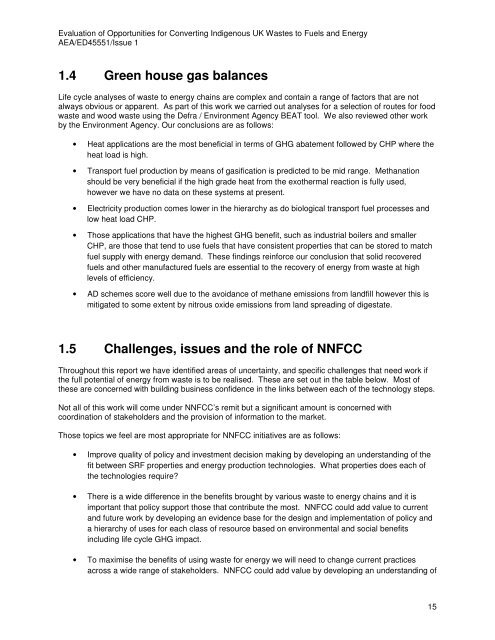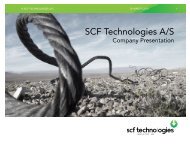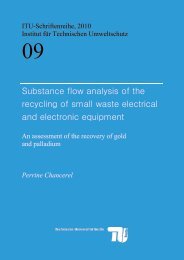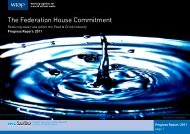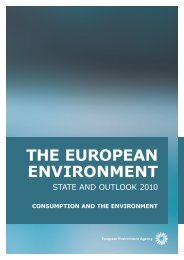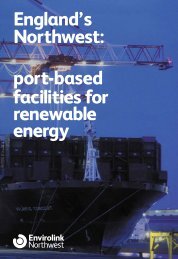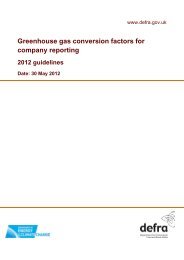to read the full report - Ecolateral by Peter Jones
to read the full report - Ecolateral by Peter Jones
to read the full report - Ecolateral by Peter Jones
Create successful ePaper yourself
Turn your PDF publications into a flip-book with our unique Google optimized e-Paper software.
Evaluation of Opportunities for Converting Indigenous UK Wastes <strong>to</strong> Fuels and Energy<br />
AEA/ED45551/Issue 1<br />
1.4 Green house gas balances<br />
Life cycle analyses of waste <strong>to</strong> energy chains are complex and contain a range of fac<strong>to</strong>rs that are not<br />
always obvious or apparent. As part of this work we carried out analyses for a selection of routes for food<br />
waste and wood waste using <strong>the</strong> Defra / Environment Agency BEAT <strong>to</strong>ol. We also reviewed o<strong>the</strong>r work<br />
<strong>by</strong> <strong>the</strong> Environment Agency. Our conclusions are as follows:<br />
• Heat applications are <strong>the</strong> most beneficial in terms of GHG abatement followed <strong>by</strong> CHP where <strong>the</strong><br />
heat load is high.<br />
• Transport fuel production <strong>by</strong> means of gasification is predicted <strong>to</strong> be mid range. Methanation<br />
should be very beneficial if <strong>the</strong> high grade heat from <strong>the</strong> exo<strong>the</strong>rmal reaction is <strong>full</strong>y used,<br />
however we have no data on <strong>the</strong>se systems at present.<br />
• Electricity production comes lower in <strong>the</strong> hierarchy as do biological transport fuel processes and<br />
low heat load CHP.<br />
• Those applications that have <strong>the</strong> highest GHG benefit, such as industrial boilers and smaller<br />
CHP, are those that tend <strong>to</strong> use fuels that have consistent properties that can be s<strong>to</strong>red <strong>to</strong> match<br />
fuel supply with energy demand. These findings reinforce our conclusion that solid recovered<br />
fuels and o<strong>the</strong>r manufactured fuels are essential <strong>to</strong> <strong>the</strong> recovery of energy from waste at high<br />
levels of efficiency.<br />
• AD schemes score well due <strong>to</strong> <strong>the</strong> avoidance of methane emissions from landfill however this is<br />
mitigated <strong>to</strong> some extent <strong>by</strong> nitrous oxide emissions from land sp<strong>read</strong>ing of digestate.<br />
1.5 Challenges, issues and <strong>the</strong> role of NNFCC<br />
Throughout this <strong>report</strong> we have identified areas of uncertainty, and specific challenges that need work if<br />
<strong>the</strong> <strong>full</strong> potential of energy from waste is <strong>to</strong> be realised. These are set out in <strong>the</strong> table below. Most of<br />
<strong>the</strong>se are concerned with building business confidence in <strong>the</strong> links between each of <strong>the</strong> technology steps.<br />
Not all of this work will come under NNFCC’s remit but a significant amount is concerned with<br />
coordination of stakeholders and <strong>the</strong> provision of information <strong>to</strong> <strong>the</strong> market.<br />
Those <strong>to</strong>pics we feel are most appropriate for NNFCC initiatives are as follows:<br />
• Improve quality of policy and investment decision making <strong>by</strong> developing an understanding of <strong>the</strong><br />
fit between SRF properties and energy production technologies. What properties does each of<br />
<strong>the</strong> technologies require?<br />
• There is a wide difference in <strong>the</strong> benefits brought <strong>by</strong> various waste <strong>to</strong> energy chains and it is<br />
important that policy support those that contribute <strong>the</strong> most. NNFCC could add value <strong>to</strong> current<br />
and future work <strong>by</strong> developing an evidence base for <strong>the</strong> design and implementation of policy and<br />
a hierarchy of uses for each class of resource based on environmental and social benefits<br />
including life cycle GHG impact.<br />
• To maximise <strong>the</strong> benefits of using waste for energy we will need <strong>to</strong> change current practices<br />
across a wide range of stakeholders. NNFCC could add value <strong>by</strong> developing an understanding of<br />
15


